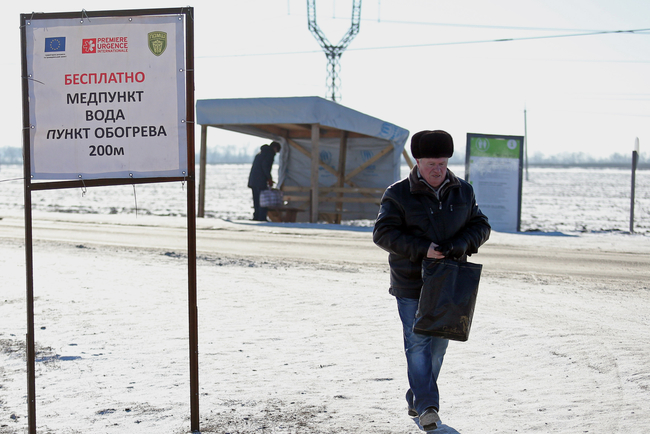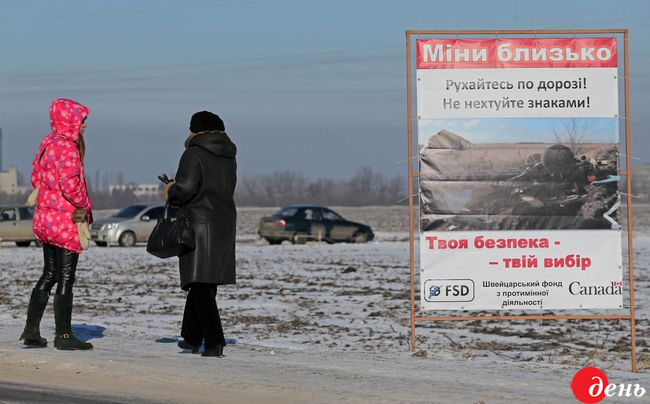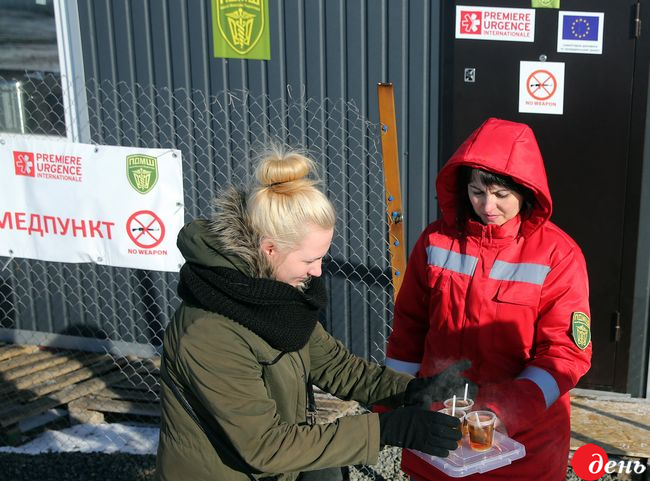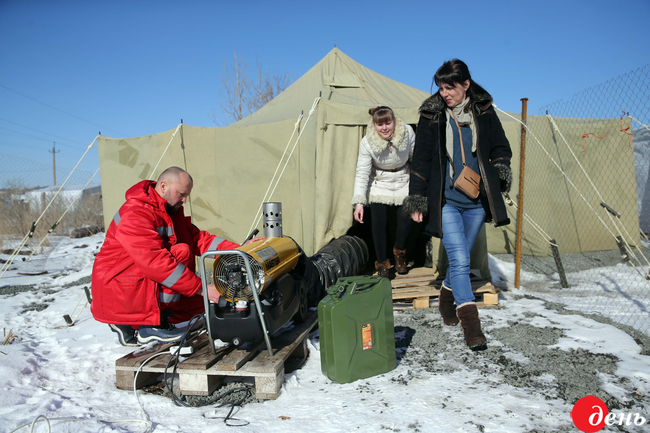The reanimation of Donbas
The Day’s special report from the front, also covering the peculiar mission of the Nikolay Pirogov First Mobile Hospital
Past summer, our newspaper’s reporters have gone on with Pirogov First Volunteer Mobile Hospital (PFVMH) to Popasna, Novoaidar, and Lysychansk. Now a new route awaits – Marinka, Avdiivka, Novotroitske, Stanytsia Luhanska, and the already familiar Popasna, where we had to get up early in the morning with the doctors, who got up to injury calls. Then it had seemed that the volunteer movement is on decline, but the doctors continued to selflessly give everything they can from rotation to rotation. However, the recent events in Avdiivka have shown us that volunteers are still able to mobilize at a critical moment.
Of course this requires help from the outside. The representatives of the foreign NGO “Premiere Urgence – Aide Medicale Internationale” went on to provide integrated and comprehensive medical care to the regions of eastern Ukraine, which allows citizens to apply to doctors at specially furnished premises at checkpoints. Cold, long queues, and constant shelling are the realities of the so-called “front end.” Den has witnessed first-hand the work of the mobile hospital, founded by Hennadii Druzenko. People of Donetsk and Luhansk regions are coming regularly at PFVMH stations for requests as simple as having a drink of a hot tea.
Ms. Lidia, pensioner, is registered in Donetsk. In the first days of the war she and her husband were forced to move to Dokuchaievsk, and then to leave the territories of Donbas altogether. She charters to Donetsk in order to look after the house. A typical situation. Before our eyes her husband has got his leg wound tended by the professionals, while his wife shared her other wound with Den. A soul wound. “We have to go to Donetsk and back,” she said. “Unfortunately, we cannot sell the apartment. And we don’t want to give it away so cheaply. But it’s too difficult to live permanently renting an apartment. And so we wander from city to city. I must say that when the fighting got worse in Avdiivka, we felt quite strangely. We were afraid, we mourned for the dead, and yet we were happy at the same time for the offensive of the Ukrainian army.” During the conversation, Ms. Lidia gradually shifts from Russian to Ukrainian. Unfortunately, she does not know that the Ukrainian army was not advancing, but was forced to defend themselves. It is well known, that Donetsk television tells made-up stories. At the first glance, one might have thought that Ms. Lidia only visits the liberated territory for her pension and keeps the pro-Ukrainian position only for demonstration. But I, being from Luhansk myself, hear something very familiar to me in the words of joy on the intensification of military operations, that speak of encouragement for Ukrainian to move on and free Donetsk. Then, in 2014, we were ready to sit in the basements just to see the Armed Forces set Luhansk free. Unfortunately, people in Luhansk were hiding in basement not from shells and mortars of the Ukrainian Army, but from the shelling of roaming “militia” provocateurs. Ukrainian army never entered Luhansk or Donetsk, and the enemy was able to dominate the thoughts of people in these cities.

The uniqueness of work that PFVMH doctors have to do lies also in the continuous contact with people of mostly anti-Ukrainian sentiment. Thus, the role of doctors also extends to psychological work with the public. However, doctors usually do not get engaged in any disputes with the locals. The real help to a person is the key to their mind. So, with the reanimation of body, they reanimate the soul, that was filled with the Russian propaganda. At the same time, they are being together with the military, under heavy threat. PFVMH doctors at Marinka checkpoint say that recently they were under Grad fire. “They fire knowing that they can hit the civilians, the doctors,” says Natalia Dmytruk, PFVMH doctor. “I do not know if even the Nazi had engaged in such atrocities.” Danger is a genuine test for sincerity and the background for even greater sacrifice. Natalia Dmytruk and Svitlana Bortniak, who were going home to Khmelnytsky after the rotation on the day of our interview, say that they would never refuse help even to a separatist in case they come to their aid. It’s not just the Hippocratic Oath. This is the personal values, the attitude to life. “Ukrainians profess peace,” says Iryna Babych, PFVMH doctor. “We are a warlike nation, but not aggressive. Human life is a primary value for us.” An indicative feature of a great doctor.
Novotroitske checkpoint. After the recent attack, the military do not allow to photograph them; they privately say that the so-called DNR’s and LNR’s sides are extremely careless to their citizens. They have nothing like heating or medical assistance points there.

People of Donetsk and Luhansk regions are coming regularly at PFVMH stations for requests as simple as having a drink of a hot tea / Photo by Artem SLIPACHUK, The Day
“PFVMH has the Ukraine gathered,” says doctor Pavlo Hrynchak at checkpoint in Novotroitske. “So when the locals ask us where we came from, the answer obvious: from Ukraine! But there are totally different people here and everything is not so clear in their assessments. Do not forget that people in Donbas live in the constant stress, the permanent tension. If Russia had not started the war against us, we might have been more complacent, and it’s dangerous. There were people who were waiting for Russia to come and give them something. And there were those who understood that if the invader comes, they will lose everything. This was typical to small and medium business owners, who are very active now in helping the military and the volunteers. An interesting point – the villages of Donbas have lot of Ukrainian-speaking people. It is not always the case that language defines worldview. However, they may not like the Ukrainian military, but once they hear that something is handed out, there is a queue in five-minute’s time.”
Pavlo Hrynchak got to war from Maidan. Together with a senior colleague Oleh Zynevych they talk about having to provide medical care on Maidan even to the Berkut and “titushky,” not just activists. There they learned that one who is on the other side of the barricades is not always the enemy. Often the so-called “titushky” were people of extreme poverty and despair, having to do that for basic earnings. Without work on consciousness one would not do much here, especially when you have to help someone who fears you. This experience was extremely helpful to PFVMH doctors at war.

“A lot of people who remember the Soviet times still associate this period with prosperity,” says Zynevych. “And it does not matter anymore what language a person speaks. Then it was good for them and now it’s bad. Russia uses it and brings this idea of the restored Union. Ukraine, by contrast, ignores its own citizens and this applies to the whole country. For 20 years, Donbas had not seen the real Ukraine at all, so it is not surprising that the enemy took advantage of such views. People were abandoned to their fate. Donbas was given away to local princes and lords back under Kuchma. The people were deceived and robbed. Everything was done so as to put people under absolute dependence. Those who get in line for humanitarian aid are very poor. Children just come to us and ask for candy. It is noteworthy that Ukrainians who remained in the so-called DNR and LNR receive pensions from two sources simultaneously. Those Ukrainians who live on the free territory, receive Ukrainian money. Of course, they are aware of this injustice and reacting accordingly. Again, where is Ukrainian television? On the Ukrainian territory people are free to watch Russian TV channels. In Donetsk and Luhansk the contrary is true – the Ukrainian television is shut down. In terms of information enemy feels like at home. So I think it is necessary to pay attention to two factors: working with children, because it’s the next generation, and raising the economy, because people are drawn to better lives. Although I can not say that the government does nothing. We already have an army. The current situation is completely different to that of the 2014. I am sure that in any case one should never speak of disbelief. This is the issue of journalists. People need the truth, the positive and meaningful vision of statebuilding.”
It was impossible not to mention the upsurge in the volunteer movement. Is it true that the movement was in decline prior to the Avdiivka events? “I think that in reality the situation in Avdiivka is exaggerated to some extent,” says Oleh Zynevych, and the other colleagues agree with him. “In fact, the volunteer movement has always existed, it’s the journalists who do not like to cover anything that does not bear a sensation within. Volunteering is a system that works as a permanent mechanism. The media hook, that is the Avdiivka events, was there to once again attract the public attention to volunteers. It so happens that there is now a surplus of volunteer assistance in Avdiivka, while other regions are experiencing the opposite – the deficit of it.”
Donbas is the concentration of different worlds and worldviews. Den’s journalists were based in Vuhledar – a peaceful city, yet closely situated to the fighting – and now together with PFVMH they continue the tour around the eastern cities, which host the hospital stations.






